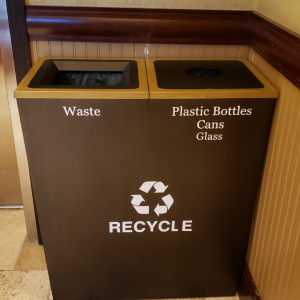Hotels and Motels
Having a successful waste reduction and recycling program is essential. Hotels can meet sustainability goals, save money and reduce facility operating costs.
Many corporate owned hotels and hotel chains have established sustainability policies. Often, unfortunately, the policies are not well communicated to all of their locations. Even with an established chain policy, each hotel location must be responsible for their own waste reduction and recycling initiatives, which are determined by the recycling infrastructure available for the region.
Having a successful waste reduction and recycling program is essential. Hotels can meet sustainability goals, save money and reduce facility operating costs. And, as customers and the general public become more focused on sustainability and patronizing eco-friendly places, there are additional conservation and environmental benefits to be enjoyed.
Try these steps to reduce waste and start a recycling program at a hotel or hospitality business.
Identify Waste Streams with a Waste Audit
You cannot manage what you do not measure. If you are already recycling, a waste audit will tell you how much contamination is in the recycling. It will also inform what weight and volume of recyclables is ending up in your trash. You also may find some other items you didn?t know could be recycled or upcycled.
Check out our step-by-step instructions for performing a waste audit. Our business recycling specialist is available for consultation and technical assistance with the auditing process.

Manage the Excess Soap
Many hotel chains have a soap recycling program in place. Check a list of hotels.
Some hotels have also switched to refillable shampoo, conditioner and lotion bottles instead of using those small travel sizes. This prevents waste and the larger bottles for refills are recyclable.

Tackle Food Waste
Food waste can account for up to 50% of what is in the trash. A waste audit will tell you the amount of food in your waste stream by weight and volume. Learn more about managing food waste on our restaurants and bars page.

Prevent Waste by Working with Hotel Suppliers and Vendors
- Can packaging from your suppliers be reduced or made recyclable? Work with them to learn how.
- Look for ways to prevent waste. Can the restaurant or bar menu be changed in any way to discourage the production of leftovers? Use LeanPath or other comparable software to track back of house waste and associated costs.
- Review stock management and inventory procedures to reduce the amount of expired or spoiled product.

Make Sure Your Bins Are Correct and Signs Clear and Concise
People only take 2 - 3 seconds to decide which bin they should place an item. Collection bins must be conveniently located, with three options available if possible. The bins should be next to each other or in a system: landfill, compost and recycling. They must be properly color-coded with easy-to-interpret signage and may vary depending upon whether they?re in the kitchen or dining area.
In guest rooms, place small blue or green recycling bins clearly labeled. The recycling bins must be located with a black or gray landfill bin right next to it.
Kitchen areas, lobbies, meeting rooms and other areas of the hotel may need different collection bin systems. Color coordination, consistency and clear signage on these bin systems is necessary.
See our guide for equipment and labels.
Educate, Educate, Educate
The most important piece for a successful hotel waste reduction and recycling program is constant education.
- Include details in the employee handbook and make it part of the on-boarding process for new employees. Discuss procedures during staff meetings and department meetings.
- Post signs and recycling literature in guest rooms and throughout the hotel.
- Perform periodic waste audits Periodic waste audits to measure success and identify any problems that may need to be addressed.
Looking for more information? Check out this detailed example of how to create a hotel recycling program.
A recycling program at a hotel can be a success. If you need assistance in setting up a business recycling program, contact the District's business recycling specialist.
